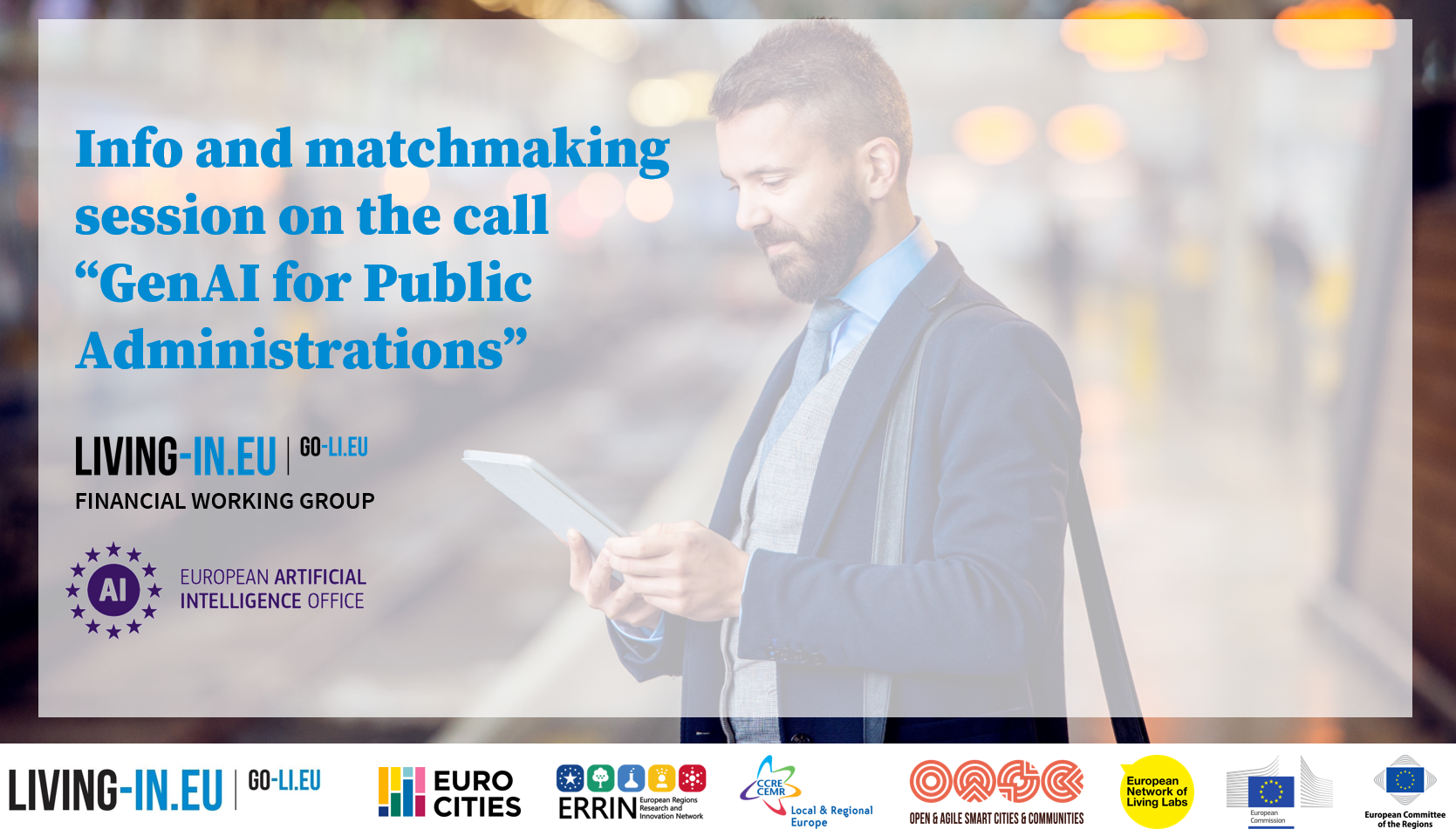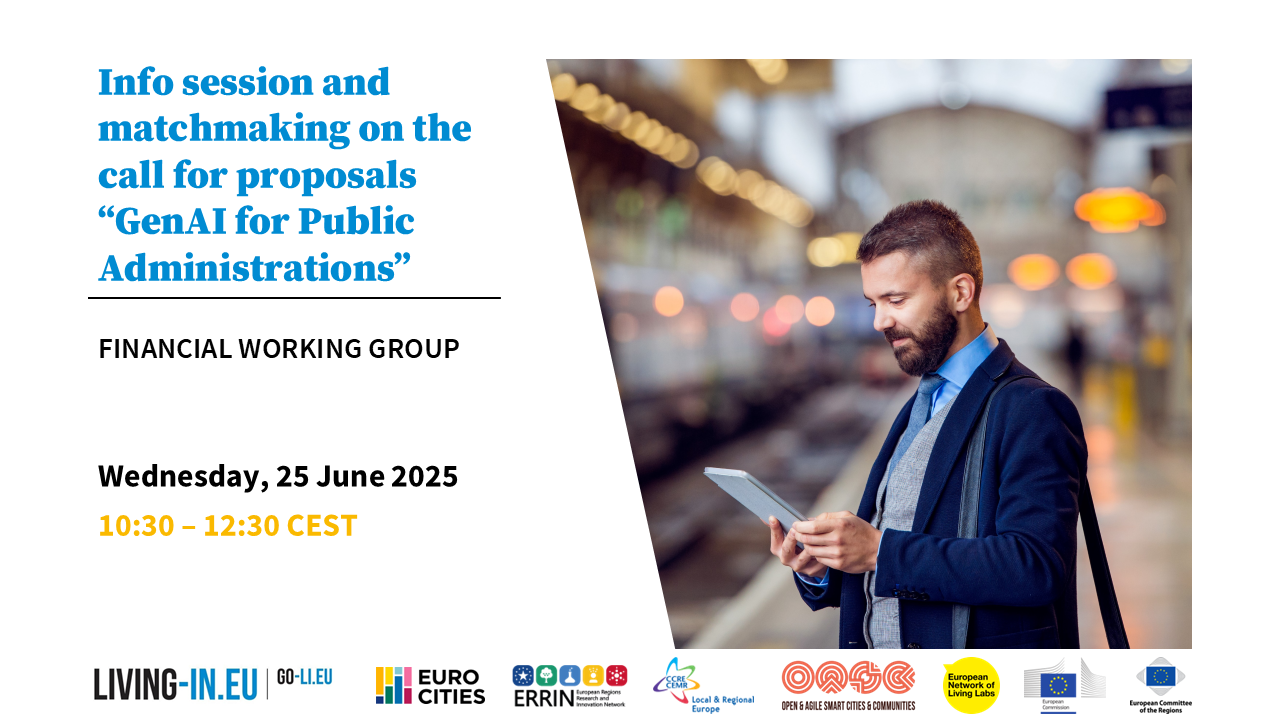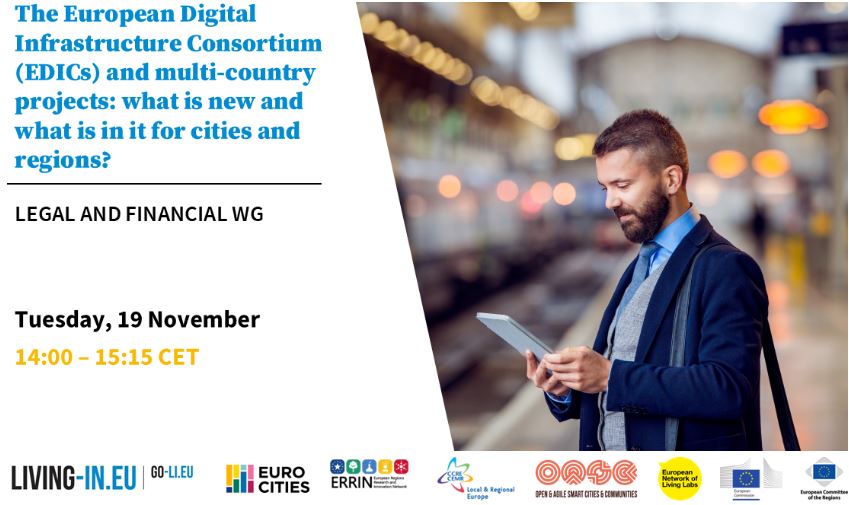Register by August 29, 2025: EC Online Matchmaking Day for applicants to the call on GenAI in Public Administration
The European Commission is organizing an online matchmaking day for applicants to the call on GenAI in Public Administration. The session will take place on September 3, 2025 between 10:00-12:00 CEST, and aims to support stakeholders that are 1) looking for additional members to join their consortium in the making, or 2) searching for a consortium to join.
You can find the the preliminary preliminary agenda here and register for the event by September 2 here.
🎤In case you would like to present your organisation or your consortium during the session, please register by August 29.
❓If you have any questions that are not already answered in the Q&A on the EU Funding & Tenders Portal and you want to address in the Q&A slot, please send them to the dedicated functional mailbox (CNECT-AI-IN-PUBLIC-ADMINISTRATION@ec.europa.eu) by 26 August, 2025.
***
About the call:
Under the Digital Europe work programme 2025-2027, the European Commission launched a call for proposals on GenAI for public administrations.The call targets public administrations at national, regional, or local level, and aims to support three to four pilot projects, each of them including one or more use cases where European GenAI solutions are developed and applied in the public administrations of the involved countries.
Deadline for application: Originally set for 2 September, the application deadline has been extended by one month — until 2 October 2025, to provide additional time for consortia to further develop their ideas, strengthen partnerships, and prepare mature project proposals for the call.
***
Useful links:
🎤On June 25, 2025, the Living-in.EU Financial Working Group and the European Commission's AI Office co-organised an info and matchmaking session to provide more information on the call and facilitate networking between interested organisations. The event brought together representatives from local and regional administrations, as well as other stakeholders from academia, civil society and the private sector. The presentation from the webinar can be found on the dedicated Financial Working Group space on the Living-in.eu webpage here.
📝To facilitate ongoing consortia building, DG CNECT is launching a survey to understand how successful consortia building could be supported.
🤝To further encourage active matchmaking and networking for consortia building, there is a NEW dedicated Collaboration space for public administrations to look for and add their own project collaborations on project ideas besides the general Project ideas and expertise space for all other stakeholders.
🚀B2Match can be also used to contact other Participants interested in building consortia, arrange and hold meetings online.
Online Matchmaking Day for applicants to the call on GenAI in Public Administration on September 3, 2025
The European Commission is organizing an online matchmaking day for applicants to the call on GenAI in Public Administration.
Deadline extended: GenAI for the public administrations call (DIGITAL-2025-AI-08-SUPPLY-AI)
In April 2025, the European Commission launched a call for proposals on GenAI for public administrations (DIGITAL-2025-AI-08-SUPPLY-AI). Originally set for 2 September, the application deadline has now been extended by one month — until 2 October 2025, to provide additional time for consortia to further develop their ideas, strengthen partnerships, and prepare mature project proposals for the call.
***
🎤On June 25, 2025, the Living-in.EU Financial Working Group and the European Commission's AI Office co-organised an info and matchmaking session to provide more information on the call and facilitate networking between interested organisations. The event brought together representatives from local and regional administrations, as well as other stakeholders from academia, civil society and the private sector. The presentation from the webinar can be found on the dedicated Financial Working Group space on the Living-in.eu webpage here.
📝To facilitate ongoing consortia building, DG CNECT is launching a survey to understand how successful consortia building could be supported.
🤝To further encourage active matchmaking and networking for consortia building, there is a NEW dedicated Collaboration space for public administrations to look for and add their own project collaborations on project ideas besides the general Project ideas and expertise space for all other stakeholders.
🚀B2Match can be also used to contact other Participants interested in building consortia, arrange and hold meetings online.
❓You can find more information and the published Q&A for the call on the EU Funding & Tenders Portal.
***
The AI Office of the European Commission has also provided a dedicated email address for further inquiries related to the Call: CNECT-AI-IN-PUBLIC-ADMINISTRATION@ec.europa.eu.
In case you have questions about the session or would like to learn more about the Financial Working Group of Living-in.EU, please do not hesitate to reach out to Ana D. Georgieva, Financial WG coordinator, at ana.georgieva@eurocities.eu.
Online event recap: Cities and regions connect for the call for proposals "GenAI for public administrations"
The European Commission has launched a call for proposals on GenAI for public administrations: On June 25, 2025, the Living-in.EU Financial Working Group and the European Commission's AI Office co-organised an info and matchmaking session to provide more information on the call and facilitate networking between interested organisations. The event brought together representatives from local and regional administrations, as well as other stakeholders from academia, civil society and the private sector.
The call for proposals - who it targets and what it covers
Ms. Ivana Zeppa and Ms. Elaine Zaunseder, policy officers at the AI Office, began with a presentation of the GenAI for public administrations call. Funded under the Digital Europe work programme 2025-2027, the grant for procurement will financially support three to four consortia aiming to procure, develop and apply European GenAI solutions in public administrations. As the level of govenment closest to citizens, local and regional authorities play a key role in the call, as they are invited to lead consortia and define the needs and use cases based on real-world public needs and challenges. The presentation included detailed information about the scope and requirements of the call, as well as practical tips for potential applicants.
Co-funding and synergy grants: what to watch out for
As the 50% co-funding rate for EU projects may be challenging for cities and regions when applying for calls, synergy grants emerge as a potential solution. Ms. Beata Bartosova, Programme Manager at DG CNECT, gave an overview of the possibilities to combine funding under the GenAI for public administrations call with other funding sources. The presentation also highlighted some key caveats for local and regional authorities to keep in mind when it comes to using e.g. ERDF or Horizon funds, and advised to closely coordinate co-funding with the European Commission and national authorities.
In addition to receiving detailed information on the call during the first part of the webinar, cities and regions were able to gain further clarity about practical aspects and voice their questions during the dedicated Q&A session.
Stakeholders connect for public sector innovation
During its matchmaking segment, the event provided a space for participants to pitch their ideas and solutions and to connect with like-minded potential applicants for the call, encouraging and facilitating the formation of consortia.
Participants from local, regional and national authorities also had the opportunity to further discuss the complex topic of AI with researchers and companies in four dedicated breakout sessions, focusing on different GenAI use cases: efficiency of internal processes, legislation and compliance, supporting decision-making, and enhancing public services.
Next steps
In July 2025, the deadline for applying for the call was extended by one month to provide additional time for consortia to further develop their ideas, strengthen partnerships, and prepare mature project proposals for the call. The new deadline is October 2, 2025. The selection of consortia is expected at the end of this year, with the grant agreements set to be signed at the beginning of 2026. You can find additional information about the call on its dedicated webpage, as well as in the detailed Q&A document.
The AI Office of the European Commission has also provided a dedicated email address for further inquiries related to the Call: CNECT-AI-IN-PUBLIC-ADMINISTRATION@ec.europa.eu.
In case you have questions about the session or would like to learn more about the Financial Working Group of Living-in.EU, please do not hesitate to reach out to Ms. Ana D. Georgieva, Financial WG coordinator, at ana.georgieva@eurocities.eu.
Living-in.EU info session and matchmaking on the call for proposals "GenAI for Public Administrations"
On 25 June 2025 at 10:30 – 12:30 CEST, the Financial Working Group of Living-in.eu will organise a matchmaking session in the context of the call for GenAI in public administration. This event aims to bring together representatives from local and regional administrations, as well as other stakeholders, such as representatives of the academia, as well as research and technology organisations, interested in or already working on the Call for proposals.
🎤During the session, we can accommodate pitches of project ideas of expertise sought/offered. If you would like to present, please indicate this in the registration form by Thursday, June 19, EOB. In case you have questions or need further information, please reach out to ana.georgieva@eurocities.eu.
✍️You can register for the session here.
***
About the Living-in.EU financial working group:
The Living-in.EU Financial working group has aims to:
- Share best practices: Exchange successful strategies and practices for financial management and resource allocation.
- Foster collaboration: Encourage partnerships between government entities, private sector, non-profits, and community organizations to address financial needs.
- Develop actionable solutions: Create a roadmap for implementing effective financial strategies and securing necessary funding.
- Identify key financial challenges: Understand the primary financial issues faced by cities, regions, and communities, including budget constraints, funding gaps, and economic disparities.
In this context, the Financial working group is also a place for networking and matchmaking for responding to specific calls for proposals targeting local and regional public administrations.
***
About the matchmaking session:
Under the Digital Europe work programme 2025-2027, the European Commission has launched a call for proposals on GenAI for public administrations with a deadline on 02 September 2025. The call will support three to four pilot projects, each of them including one or more use cases where European GenAI solutions are developed and applied in the public administrations of the involved countries. The call targets public administrations at national, regional, or local level.
With the summer holidays in view, and the approaching deadline, many local and regional authorities are already actively working on proposals, finetuning use cases, looking for additional partners or funding to ensure the 50% co-funding.
With this session, organized together with the AI Office of the European Commission, we want to:
- Support interested local and regional authorities with more information and practical tips about the call.
- Provide information on the possibility of using synergy grants combining funding from Digital Europe with decentralized funds such as ERDF (the 50% co-funding being one of the main challenges).
- Provide a dedicated safe space for questions and clarifications.
- Facilitate networking and matchmaking between organisations interested in a similar use-case/application area and/or looking for additional expertise (in breakout rooms).
Examples of use cases/application areas
- Using GenAI to support and increase efficiency of internal processes
- Using GenAI to summarise legislation or monitor compliance
- Using GenAI to support decision-making and data-driven urban planning (by enhancing tools such as local digital twins)
- Using GenAI to enhance public services and personalized citizen-centric service delivery (e.g. chatbots with enhanced personalized features)
- Using GenAI to involve residents in urban planning (incl. via data spaces; CitiVerse applications; generation and interaction of avatars in eXtended Reality etc.)
***
Draft agenda:
The session will be structured around 3 main parts:
10:30 – 10:35 | Introduction and welcome (5’) | Gabriela Ruseva, Living-in.EU coordinator, Eurocities
10:35 – 11:05 | Part 1: Overview of the Call for GenAI in public administrations (30’)
- 10:35 – 10:50 | Overview of the Call for GenAI in public administration (15’) | Ivana Zeppa, Policy Officer, AI Office, DG CNECT, European Commission
- 10:50 – 11:05 | Synergy funds: overview and opportunities (15’) | Beata Bartosova, Programme Manager, Multi Country Project Accelerator, DG CNECT, European Commission
11:05 – 11:30 | Part 2: Q&A session (25’) | Ana D. Georgieva, Forum and Project Officer – Digital, Eurocities; Living-in.EU Financial WG coordinator
11:30 – 12:25 | Part 3: Matchmaking and networking session* in breakout rooms around the identified needs (55’)
12:25 – 12:30 | Conclusion and next steps (5’)
Living-in.EU info session and matchmaking on the call for proposals "GenAI for Public Administrations"
Background:
Online Event Recap: How EDICs and Multi-Country Projects Benefit Cities and Regions
On November 19, 2024, Living-in.EU signatories gathered online to explore the topic “The European Digital Infrastructure Consortium (EDICs) and Multi-Country Projects: What’s New and What’s in It for Cities and Regions?”. Organized by Living-in.EU in the context of the Legal & Financial Working Group, this engaging session shed light on recent developments, opportunities, and challenges surrounding EDICs and their implications for cities and regions.
What are EDICs?
Beata Bartosova, Programme Manager at DG CNECT, began by outlining the role of EDICs in driving large-scale digital transformation across the EU. EDICs, part of the Digital Decade Policy Programme, enable member states to pool resources to achieve collective digital goals that would be unattainable by individual countries.
Key features of EDICs include:
-
Rapid setup and flexible implementation.
-
A legal structure allowing cities, regions, and other entities to participate alongside member states.
-
Financial backing from member states, supplemented by EU funds and external contributions.
Recent updates highlighted the growing portfolio of EDICs, including the LDT CitiVerse and EUROPEUM Blockchain EDICs, and plans to establish new projects focusing on mobility, cybersecurity, and healthcare.
LDT CitiVerse: A Vision for Smart Cities
Ernesto Faubel and Jordi Ortuno Ribé presented the latest progress in the LDT CitiVerse EDIC, an initiative dedicated to fostering smart city ecosystems in Europe. With 13 member states already committed, the consortium emphasizes collaboration across sectors to advance urban innovation.
The LDT Toolbox, a key deliverable, offers practical tools for cities of all sizes to implement AI and data-driven projects. The first General Assembly is set for December 2024 in Valencia, marking a significant milestone for this EDIC.
EUCAIM: Transforming Medical Imaging
The session also featured a deep dive into the EUCAIM project, which seeks to revolutionize medical imaging by integrating data with genetics and AI. Coordinated by La Fe Health Research Institute, EUCAIM aims to enhance healthcare delivery and support innovation within the European Health Data Space.
Luís Martí Bonmatí presented some of the achievements so far, including centralizing access to medical data and tools, building capacity for data interoperability, and ensuring long-term sustainability. The project envisions evolving into a legal entity under an EDIC framework.
Engaging Cities and Regions
Throughout the session, speakers emphasized the potential for cities and regions to play an active role in EDICs. While participation requires compliance with specific conditions, opportunities abound for cities to influence the direction of multi-country projects, benefit from shared resources, and contribute to policy goals like the Digital Decade targets.
Looking Ahead
As EDICs continue to expand, initiatives like the LDT CitiVerse and EUCAIM exemplify how collaboration can drive meaningful progress. Living-in.EU will continue following developments of the EDICs and sharing relevant updates and information with Living-in.EU signatories.
To access the slides and recording from the session, sign in into the Finacial WG space!
Give your feedback on the Digital Europe Programme with Living-in.EU
Discover Multi Country Projects and European Digital Infrastructure Consortiums EDICs
On 11 September 2023, Living-in.EU financial subgroup welcomed its members to an online webinar to discover the Multi Country Projects and the objective and role of the European Digital Infrastructure Consortiums (EDICs).
A brief of the session, as well as speakers' presentations and the recording, are now available.
Multi-Country Projects and the role of cities, regions & communities
As part of the “Path to the Digital Decade” policy program, the European Commission has set up a mechanism for Multi-Country projects with Member States. Their objective is to achieve the targets for the digital transformation of the Union and the EU’s industrial recovery. By pooling EU, national and private resources, Multi-Country projects aim to facilitate investments in various areas, such as Common data and Infrastructure, deployment of 5G corridors, High-Performance computing, Local Digital Twins and several more.
During the online webinar, Serge Novaretti, policy officer and programme manager at the European Commission, explained the key features of the EDICs, the main steps needed to set up multi-country projects and key requirements.
For instance, it is important to notice that an EDIC should composed of at least three Member States (MSs). For cities to join the EDICs, it is necessary for their MSs to be part of the EDICs or for their MSs to have sent the pre-notification to set-up an EDIC. Another opportunity for cities to join the EDIC is to be nominated by the MSs to be part of the EDICs Assembly. Other possibilities for cities to join the EDICs are currently being discussed.
The EDIC on Networked Local Digital Twins towards the Citiverse
Serge Novaretti also gave specific insights into the EDIC on Networked Local Digital Twins towards the Citiverse. The objective of this EDIC is to establish a network of digital twins that operate among them and across borders. Many cities and communities are experimenting with Local Digital Twins, but federated solutions would allow them to implement much more efficient tools that could better tackle societal and environmental challenges at EU scale.
The example of the EDIC on Local Digital Twins demonstrates how multi-country projects and EDICs could support cities, regions and communities, in pooling resources, accessing common resources and capacities, sharing know-how, acquiring new skills, competences and contributing to European projects.
Local Perspective on the EDICs and on Local Digital Transformation
A local perspective on the EDICs and local digital transformation was provided by Ernesto Faubel from the city of Valencia and Alexandre Chaffotte from “Banque des Territoires”.
Currently, the city of Valencia together with the city of Barcelona is co-leading the launch process for EDIC on LDT towards Citiverse, together with the support of the Spanish Government, the Ministry of Economic Affairs and digital transformation, and the Spanish network of cities (RECI). As highlighted by Ernesto Faubel, the LDTs developed under this EDIC could be seen as an evolution of geographical information system in 3D HQ modelling with simulation scenarios and real-time data, and with a strong focus on standardization and interoperability.
Interoperability and standardization are also two fundamental aspects of the digital transformation programs developed under the France 2030 programme for boosting local digital transformation. As presented by Alexandre Chaffotte, the French National public agency is currently funding several innovative projects, to define standardisation principles and to co-create interoperable solutions in which local governments, private sector and academic actors are encouraged to participate.
Advantages of EDICs for Member States, Regions and Cities
EDICs represents a key instrument for public authorities to collaborate for the development of innovative and interoperable digital solutions. They would allow to gather essential resources such as toolkits, dataspaces, and project groups which will become available and reusable among public authorities in Europe. Moreover, they would allow to explore synergies among various initiatives, optimizing knowledge exchanges and fostering innovative approaches in cities and communities.
As discussed during the webinar, the EDICs are currently being set up, and therefore, the discussions around their governance and modalities are still ongoing. Living-in.EU gives the possibility to its signatories to stay updated on the evolution of these significant opportunities for cities. If you are not yet a Living-in.EU signatory, you can easily join the movement without any financial commitment required, by signing the declaration here.
Living-in.EU signatories can access all the presentations from the session and the recording on the Living-in.EU platform in the financial subgroup here (login required).












